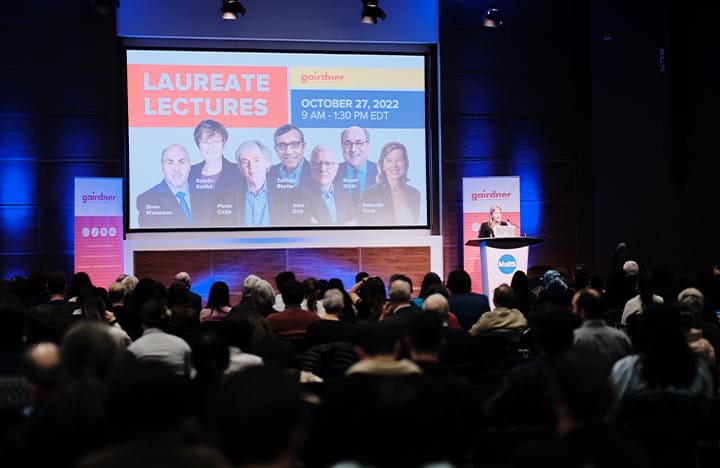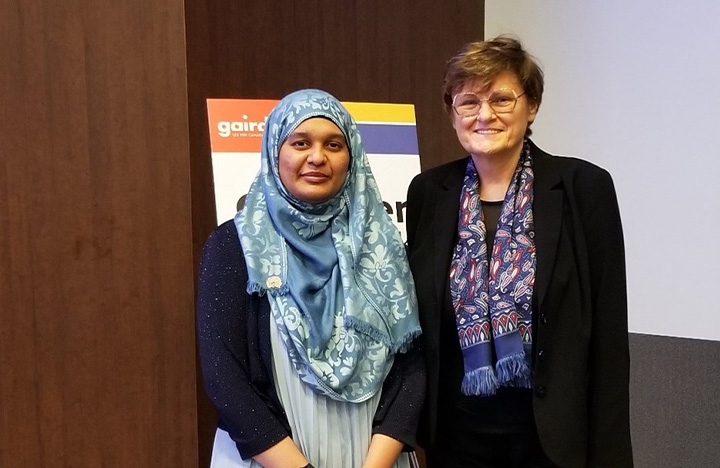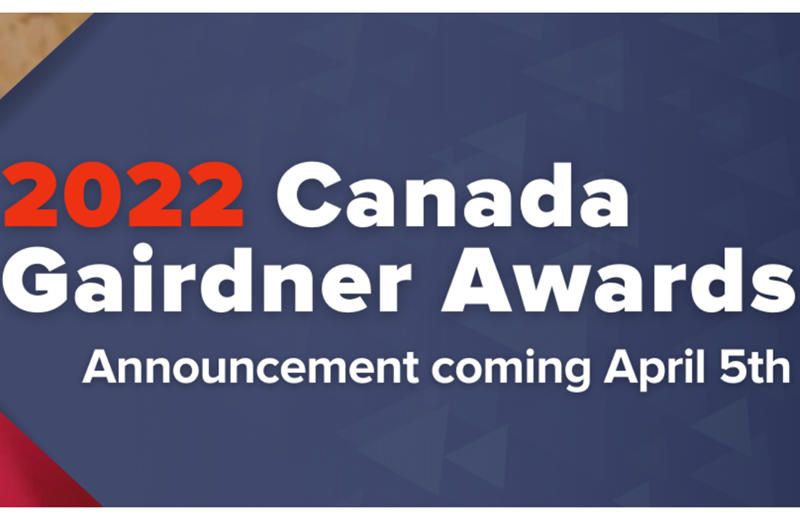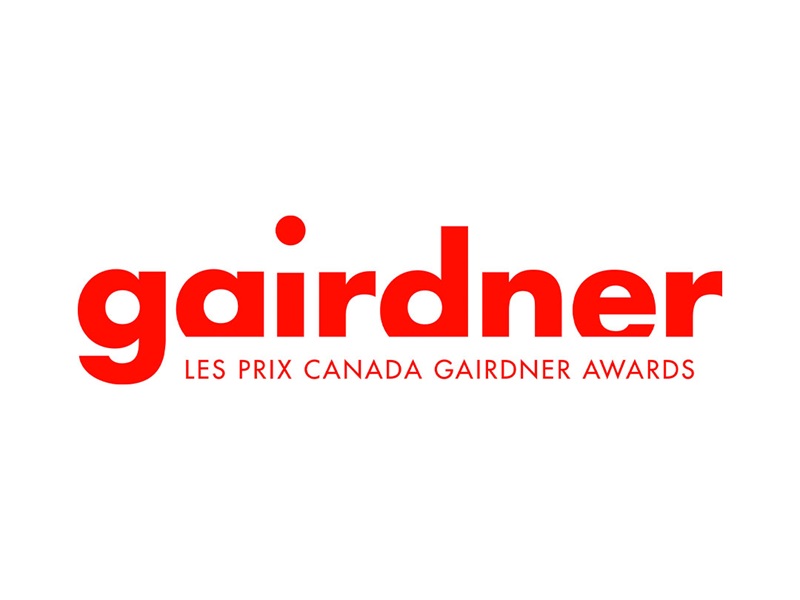Gairdner Science Week: A Recap from Science Communicator Farah Qaiser

Last week, students, researchers, journalists and more attended Gairdner Science Week, a celebration of the 2022 Canada Gairdner Award Laureates and ground-breaking research. What made the week particularly special is that it was the first in-person Gairdner Science Week since the beginning of the COVID-19 pandemic in 2019.
I first attended Gairdner Science Week (virtually) in 2016, when I was writing about the event for my university’s campus newspaper. I remember excitedly tuning in to hear all about CRISPR and gene editing from Drs. Jennifer Doudna and Emmanuelle Charpentier in the middle of my undergraduate Bioinformatics class. Later, amid the pandemic, I put my science communication skills into practice, and partnered with the Gairdner Foundation to amplify and celebrate scientific discoveries, ranging from interviewing the 2020 and 2021 Laureates, to live-tweeting about panels related to gene therapies or COVID-19, and lectures featuring the Laureates.
So, for me, this Gairdner Science Week was a chance to meet and hear from world-leading scientists, including some that I had interviewed virtually before.
Here’s a recap of the week, and some of my key takeaways
Gairdner Science Week kicked off on Monday, October 24 with both past and current Laureates visiting schools across Canada to meet with students, share their science, and offer in-person mentorship. By Wednesday, the Laureates were back in Toronto.
On Wednesday, I attended the Gairdner International Symposium: Changing views of the hematopoietic stem cell. This symposium was a celebration of 2022 Canada Gairdner International Award laureate Dr. John Dick’s work, and an exploration of the recent strides made in the field of blood stem cells.
For context: stem cells are a small but powerful subset of cells, with the ability to self-renew (i.e. divide infinitely), and generate different cell types (such as cardiac cells). Specifically, hematopoietic stem cells give rise to other blood cells, such as phagocyte-eating macrophages and oxygen-carrying red blood cells.
Throughout the symposium, several scientists, including Dr. Tsvee Lapidot (a past member in Dr. Dick’s lab), provided insights into what we know about the hematopoietic stem cell today. This included questions, such as: how do blood cells develop? Is their fate determined by their environment? We learned that in the context of cancer, not all cancer cells are equal – in fact, only cancer stem cells can continuously produce new cells and fuel long-term cancer growth.
While it was fascinating to hear about the science of blood stem cells, it was even more heart-warming to hear the invited scientists thank Dr. Dick for his mentorship or collaborations over the years. It was clear: the science is important, but so are the people who are carrying out the work.
Next, on Thursday, October 27, the annual Gairdner Laureate Lectures kicked off bright and early at the MaRS Discovery District. The auditorium quickly filled up, with many keen high school students sitting towards the front.

The Gairdner Laureate lectures took place on October 27, 2022.
I arrived a little earlier, in hopes of meeting Dr. Katalin Karikó, one of the 2022 Laureates, whose work was critical in developing the foundational technology (mRNA!) necessary for the COVID-19 vaccines. Earlier this year, I interviewed Dr. Karikó and Dr. Drew Weissman, and wrote about their work exploring mRNA, in the form of a comic and essay, for high school students.
Spoiler alert: I did get a photo!

Pictured: Farah Qaiser and Dr. Katalin Karikó, 2022 Canada Gairdner International Award winner.
It’s hard to recap all five hours of the Laureate lectures, but here are a few highlights:
- Katalin Karikó walked through the many incremental, and critical, scientific developments which deepened our understanding of mRNA, and how this early progress gave her hope that mRNA could be used for therapies. Twenty years ago, the COVID-19 mRNA vaccines would not have been possible.
- Drew Weissman shared how mRNA therapies are being developed to treat various diseases, from sickle cell anemia to post-stroke conditions. Today, mRNA therapies, coupled with lipid nanoparticles, are possible, more cost-effective, and can target a variety of organs. Similarly, Dr. Peter Cullis emphasized that the journey is just beginning, with third generation mRNA-lipid nanoparticle gene therapies.
Dr. Zulfiqar Bhutta introduced the concept of the “first thousand days” of life – that experiences during this period can have life-long consequences for health and wellbeing. He shared how his research group, both in Canada and Pakistan, have developed and evaluated evidence-based interventions in child and maternal health. What’s next? For Dr. Bhutta, it’s all about placing children at the centre of the UN Sustainable Development Goals.
.jpg?sfvrsn=b6ab8fe2_1)
Dr. Drew Weissman giving a talk about mRNA therapeutics during the Laureate lectures.
The Laureate Lectures also featured short talks from early career researchers, each of whom had been selected by a Laureate. As a result, we were able to catch a glimpse into how scientists are currently advancing research in different fields. For example, I enjoyed hearing from Dr. Anna Blakney, an Assistant Professor at the University of British Columbia. She shared how her lab is advancing RNA molecular engineering and building better vaccines. Dr. Blakney also emphasised that public engagement is critical to close the gap between the scientific progress that is being made, and what the public knows.
Finally, on Thursday evening, thanks to Let’s Talk Science, I attended the Gairdner Awards Gala for a night of networking and celebration. We listened as each Laureate received their award, thanked their loved ones and all who made the work possible, and shared their words of wisdom.
For example, Dr. Cullis requested that You Can’t Always Get What You Want by the Rolling Stones be played as he approached the podium. He shared that this song also applies to science: while the company he founded to market lipid nanoparticles as a drug delivery mechanism was unsuccessful, the very same lipid nanoparticles were critical in the COVID-19 mRNA vaccines. I was also very touched to hear Dr. Bhutta’s tribute to his late wife, Dr. Shereen Zulfiqar Bhutta, who passed away in September 2022.
My personal highlight from the Gala was running into Drs. Quarraisha & Salim Abdool Karim! I had interviewed them in 2020 in recognition of their John Dirks Canada Gairdner Global Health Award, received for their work in developing a gel to prevent sexually acquired HIV infections in women, empowering women to protect themselves. And I can confirm: the duo are warm, lovely, and truly inspirational.
















-min-(1).tmb-cfthumb_fb.jpg?Culture=en&sfvrsn=ef561fc0_1)

